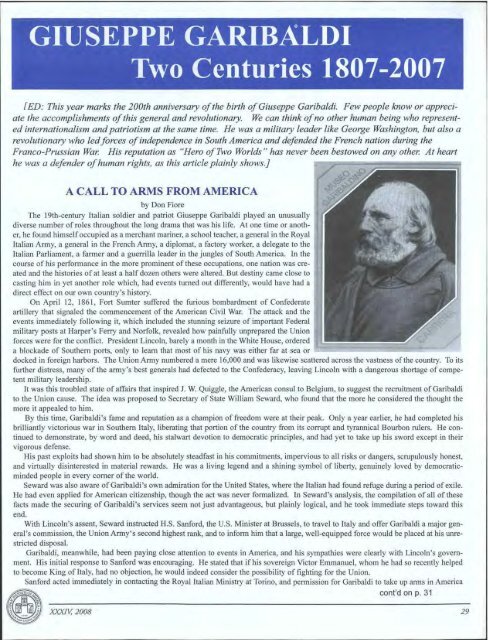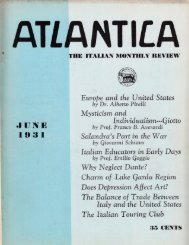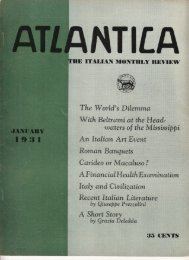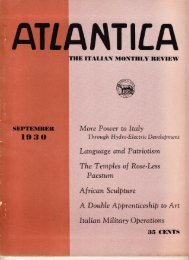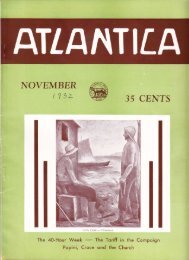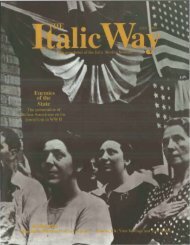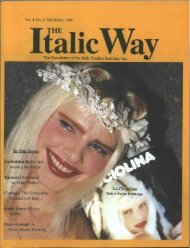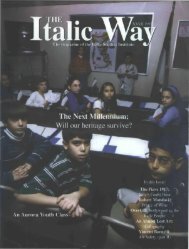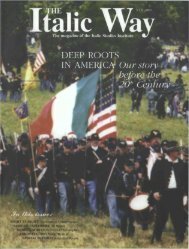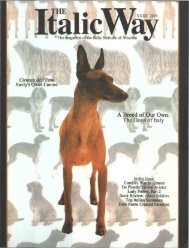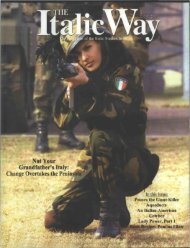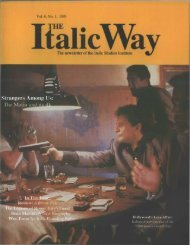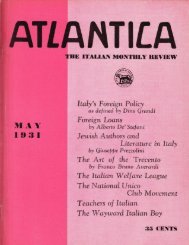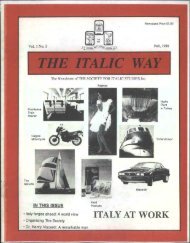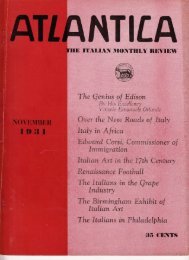nancy pelosi speaker of the united states house - Italic Institute of ...
nancy pelosi speaker of the united states house - Italic Institute of ...
nancy pelosi speaker of the united states house - Italic Institute of ...
Create successful ePaper yourself
Turn your PDF publications into a flip-book with our unique Google optimized e-Paper software.
GIUSEPPE GARIBALDI<br />
Two Centuries 1807-2007<br />
[ED: This year marks <strong>the</strong> 200th anniversary <strong>of</strong> <strong>the</strong> birth <strong>of</strong> Giuseppe Garibaldi. Few people know or appreciate<br />
<strong>the</strong> accomplishments <strong>of</strong> this general and revolutionary. We can think <strong>of</strong> no o<strong>the</strong>r human being who represented<br />
internationalism and patriotism at <strong>the</strong> same time. He was a military leader like George Washington, but also a<br />
revolutionary who led forces <strong>of</strong> independence in South America and defended <strong>the</strong> French nation during <strong>the</strong><br />
Franco-Prussian War. His reputation as "Hero <strong>of</strong>Two Worlds" has never been bestowed on any o<strong>the</strong>r. At heart<br />
he was a defender <strong>of</strong> human rights, as this article plainly shows.]<br />
A CALL TO ARMS FROM AMERICA<br />
by Don Fiore<br />
The 19th-century Italian soldier and patriot Giuseppe Garibaldi played an w1usually<br />
diverse number <strong>of</strong> roles throughout <strong>the</strong> long drama that was his life. At one time or ano<strong>the</strong>r,<br />
he found himself occupied as a merchant mariner, a school teacher, a general in <strong>the</strong> Royal<br />
Italian Army, a general in <strong>the</strong> French Army, a diplomat, a factory worker, a delegate to <strong>the</strong><br />
Italian Parliament, a farmer and a guerrilla leader in <strong>the</strong> jungles <strong>of</strong> South America. In <strong>the</strong><br />
course <strong>of</strong> his performance in <strong>the</strong> more prominent <strong>of</strong> <strong>the</strong>se occupations, one nation was created<br />
and <strong>the</strong> histories <strong>of</strong> at least a half dozen o<strong>the</strong>rs were altered. But destiny came close to<br />
casting him in yet ano<strong>the</strong>r role which, had events turned out differently, would have had a<br />
direct effect on our own country's history.<br />
On April 12, 1861, Fort Sumter suffered <strong>the</strong> furious bombardment <strong>of</strong> Confederate<br />
artillery that signaled <strong>the</strong> commencement <strong>of</strong> <strong>the</strong> American Civil War. The attack and <strong>the</strong><br />
events immediately following it, which included <strong>the</strong> stunning seizure <strong>of</strong> important Federal<br />
military posts at Harper's Ferry and Norfolk, revealed how painfully unprepared <strong>the</strong> Union<br />
forces were for <strong>the</strong> conflict. President Lincoln, barely a month in <strong>the</strong> White House, ordered<br />
a blockade <strong>of</strong> Sou<strong>the</strong>rn ports, only to learn that most <strong>of</strong> his navy was ei<strong>the</strong>r far at sea or<br />
docked in foreign harbors. The Union Army numbered a mere 16,000 and was likewise scattered across <strong>the</strong> vastness <strong>of</strong> <strong>the</strong> country. To its<br />
fur<strong>the</strong>r distress, many <strong>of</strong> <strong>the</strong> army's best generals had defected to <strong>the</strong> Confederacy, leaving Lincoln with a dangerous shortage <strong>of</strong> competent<br />
military leadership.<br />
It was this troubled state <strong>of</strong> affairs that inspired J. W. Quiggle, <strong>the</strong> American consul to Belgium, to suggest <strong>the</strong> recruitment <strong>of</strong> Garibaldi<br />
to <strong>the</strong> Union cause. The idea was proposed to Secretary <strong>of</strong> State William Seward, who found that <strong>the</strong> more he considered <strong>the</strong> thought <strong>the</strong><br />
more it appealed to him.<br />
By this time, Garibaldi's fame and reputation as a champion <strong>of</strong> freedom were at <strong>the</strong>ir peak. Only a year earlier, he had completed his<br />
brilliantly victorious war in Sou<strong>the</strong>rn Italy, liberating that portion <strong>of</strong> <strong>the</strong> country from its corrupt and tyrannical Bourbon rulers. He continued<br />
to demonstrate, by word and deed, his stalwart devotion to democratic principles, and had yet to take up his sword except in <strong>the</strong>ir<br />
vigorous defense.<br />
His past exploits had shown him to be absolutely steadfast in his commitments, impervious to all risks or dangers, scrupulously honest,<br />
and virtually disinterested in material rewards. He was a living legend and a shining symbol <strong>of</strong> liberty, genuinely loved by democraticminded<br />
people in every comer <strong>of</strong> <strong>the</strong> world.<br />
Seward was also aware <strong>of</strong> Garibaldi's own admiration for <strong>the</strong> United States, where <strong>the</strong> Italian had found refuge during a period <strong>of</strong> exile.<br />
He had even applied for American citizenship, though <strong>the</strong> act was never formalized. In Seward's analysis, <strong>the</strong> compilation <strong>of</strong> all <strong>of</strong> <strong>the</strong>se<br />
facts made <strong>the</strong> securing <strong>of</strong> Garibaldi's services seem not just advantageous, but plainly logical, and he took immediate steps toward this<br />
end.<br />
With Lincoln's assent, Seward instructed H.S. Sanford, <strong>the</strong> U.S. Minister at Brussels, to travel to Italy and <strong>of</strong>fer Garibaldi a major general's<br />
commission, <strong>the</strong> Union Army's second highest rank, and to inform him that a large, well-equipped force would be placed at his Wlfestricted<br />
disposal.<br />
Garibaldi, meanwhile, had been paying close attention to events in America, and his sympathies were clearly with Lincoln's government.<br />
His initial response to Sanford was encouraging. He stated that if his sovereign Victor Emmanuel, whom he had so recently helped<br />
to become King <strong>of</strong>ltaly, had no objection, he would indeed consider <strong>the</strong> possibility <strong>of</strong> fighting for <strong>the</strong> Union.<br />
Sanford acted immediately in contacting <strong>the</strong> Royal Italian Ministry at Torino, and permission for Garibaldi to take up arms in America<br />
cont'd on p. 31<br />
XXXIV, 2008 29


